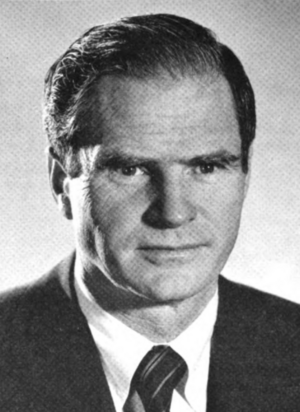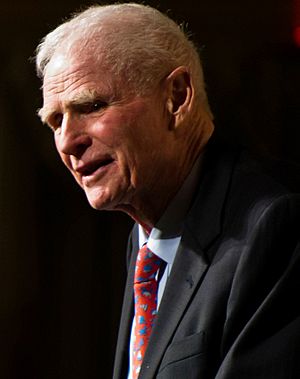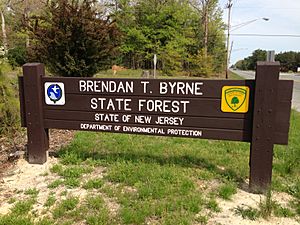Brendan Byrne facts for kids
Quick facts for kids
Brendan Thomas Byrne
|
|
|---|---|

Byrne c. 1974
|
|
| 47th Governor of New Jersey | |
| In office January 15, 1974 – January 19, 1982 |
|
| Preceded by | William Cahill |
| Succeeded by | Thomas Kean |
| Prosecutor of Essex County | |
| In office February 16, 1959 – January 11, 1968 |
|
| Appointed by | Robert B. Meyner |
| Preceded by | Charles Webb |
| Succeeded by | Joseph P. Lordi |
| Personal details | |
| Born |
Brendan Thomas Byrne
April 1, 1924 West Orange, New Jersey, U.S. |
| Died | January 4, 2018 (aged 93) Livingston, New Jersey, U.S. |
| Political party | Democratic |
| Spouses |
Jean Featherly
(m. 1953; div. 1993)Ruthi Zinn
(m. 1994) |
| Children | 7 |
| Education | Princeton University (BA) Harvard University (LLB) |
| Military service | |
| Allegiance | |
| Branch/service | |
| Years of service | 1943–1945 |
| Rank | |
| Unit | United States Army Air Forces 414th Bombardment Squadron, 97th Bombardment Group |
| Awards | Distinguished Flying Cross Air Medal (4) |
Brendan Thomas Byrne (April 1, 1924 – January 4, 2018) was an important American politician and lawyer. He served as the 47th Governor of New Jersey from 1974 to 1982. He was a member of the Democratic Party.
During his time as governor, Byrne helped open the first casinos in Atlantic City. He also worked to protect many forests and wildlife areas in New Jersey. People knew him for his honesty. An old recording from the 1960s even called him "the man who couldn't be bought." This reputation helped him win his election.
A sports arena in New Jersey, the Meadowlands Arena, was named Brendan Byrne Arena in his honor for many years. There is also a place called Brendan Byrne State Forest. In 2011, he was added to the New Jersey Hall of Fame for his service to the state.
Contents
Early Life and School
Brendan Byrne was born and grew up in West Orange, New Jersey. He was one of five children. His parents were Irish American and Catholic. His father, Francis A. Byrne, worked as a public safety commissioner in their town.
In 1942, Byrne finished high school at West Orange High School. He was the president of the debate club and his senior class. He joined the U.S. Army in 1943. During World War II, he was a navigator on a B-17 plane in the U.S. Army Air Forces. He earned special awards for his bravery, like the Distinguished Flying Cross. By 1945, he was a lieutenant.
After the war, Byrne went to Princeton University for two years. He studied public and international affairs. He then went to Harvard Law School and earned his law degree in 1951. Before working for the government, he was a private lawyer in Newark and East Orange.
Becoming a Politician
In 1955, Byrne started working for Governor Robert B. Meyner. He became an assistant counsel, which is like a legal advisor. Later, he became the Governor's executive secretary. In 1959, Governor Meyner appointed him as the prosecutor for Essex County. He held this job for many years.
From 1968 to 1970, Byrne led the Board of Public Utilities Commissioners. This board helps manage public services like electricity and water. In 1970, Governor William T. Cahill appointed him to the Superior Court, where he served as a judge. In 1973, Byrne left his judge position to run for governor.
Winning the Governor's Race in 1973
Brendan Byrne won the Democratic Party's nomination for governor in 1973. He then won the main election by a lot, beating Republican Charles Sandman. This big win also helped Democrats gain many seats in the state legislature.
First Term as Governor
Brendan Byrne became the 47th governor of New Jersey on January 15, 1974. During his first term, he made some big changes.
- He put in place New Jersey's first state income tax. This tax helps fund many state services.
- He set limits on how much local and state governments could spend.
- He created new government departments, like the Department of the Public Advocate and the Department of Energy.
- He also started public funding for future governor elections.
The income tax was not very popular at first. Some people even called him "One-Term Byrne" because of it.
Winning Re-election in 1977
Despite some people being unhappy about the income tax, Byrne ran for re-election in 1977. He won the Democratic nomination again. He then beat his Republican opponent, State Senator Raymond Bateman, in the general election.
Byrne and Bateman had many debates. Byrne used his position as governor to show his work around the state. He also got help from President Carter. A key factor was that New Jersey homeowners started getting rebate checks from the income tax. This helped show the tax was helping people.
Until 2021, Brendan Byrne was the last Democrat to win re-election as Governor in New Jersey.
Second Term as Governor
During his second term, Governor Byrne focused on several important projects:
- He helped pass the Pinelands Protection Act, which protects a large natural area in New Jersey.
- He oversaw improvements to major highways, like the Atlantic City Expressway and Interstate 287.
- He worked on upgrading sewage systems.
- He continued developing the Meadowlands Sports Complex.
- He also supported the growth of casino-hotels in Atlantic City.
Byrne is one of only two Democrats in the last fifty years to be elected governor twice in New Jersey.
After Being Governor
After leaving office in 1982, Governor Byrne became a senior partner at a law firm in Roseland, New Jersey. He also wrote a weekly newspaper column with his successor, Governor Thomas Kean. They discussed state and national issues. Byrne also taught classes at Princeton University and Rutgers University.
In 2014, a book about him was published called New Jersey Governor Brendan Byrne: The Man Who Couldn't Be Bought.
In 2010, while on vacation in London, Byrne was punched by a man. He joked about it, comparing it to a charity boxing match he had with Muhammad Ali in 1979.
Family Life
Brendan Byrne married Jean Featherly in 1953. They had seven children together. They divorced in 1993. In 1994, he married his second wife, Ruth Zinn. Jean Byrne passed away in 2015.
His Passing
Brendan Byrne died on January 4, 2018, in Livingston, New Jersey. He was 93 years old and passed away from a lung infection.
His funeral was held at the Paper Mill Playhouse in Millburn. Many important people attended, including the current and former governors of New Jersey. His ashes were placed in Princeton Cemetery.
His Legacy
In 2006, Rutgers University created the Brendan T. Byrne Archive. This is an online collection of documents and videos from his time as governor.
The Brendan T. Byrne State Forest is named after him. The Brendan Byrne Arena was also named for him for many years.
Byrne's son, Tom Byrne, was involved in New Jersey politics in the 1990s. His oldest granddaughter, Meaghan, works for the U.S. House of Representatives.
In 2011, Brendan Byrne was inducted into the New Jersey Hall of Fame.
Images for kids
 | Delilah Pierce |
 | Gordon Parks |
 | Augusta Savage |
 | Charles Ethan Porter |



